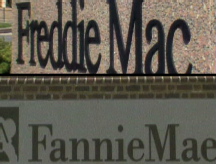Volcker calls for more Street regulation
Former Fed chair says the central bank needs to monitor investment banks more closely but that the Fed shouldn't have all the oversight duties.
NEW YORK (CNNMoney.com) -- Sen. Charles Schumer, D-N.Y., said Wednesday he believes the credit crisis may get worse and that regulatory failings helped fuel the problems rocking the economy.
The chairman of the Joint Economic Committee presided over a hearing exploring the problems in the credit markets and what changes in regulation were necessary to avoid future market disruptions. Witnesses included former Federal Reserve Chairman Paul Volcker and experts from a number of leading think tanks.
Schumer said he shared the hope of economists that "the worst of the credit crisis is behind us, but I am not convinced that it is over."
Schumer called for more regulation of investment banks, echoing a proposal by Treasury Secretary Henry Paulson to update how the nation's financial sector is supervised.
"In my view, this credit crisis is as much a failure of regulation as it is a failure of the marketplace," Schumer said. "We have a 21st century global financial system, but a 20th century national set of financial regulations. That needs to change soon."
Schumer criticized the administration and Republican members of Congress who argue that government should do everything possible to avoid interfering with markets.
"The market does not solve all problems by itself and neither does the government," he said.
Volcker suggested the failures in the credit markets were widespread, ranging from regulation to basic economic problems such as the rising U.S. trade gap. He endorsed the idea of the Fed becoming the principal financial regulator, although he cautioned that the central bank "is not equipped to do it now."
He said a greater oversight role for the Fed would require the creation of a new position filled by an official who is held accountable. But he suggested that the needed regulatory changes will not be easy to accomplish.
"The life of a regulator is not a happy one. When things are going well no one wants to be regulated," he said. "When things go bad, everyone asks, 'Where were you?' "
Volcker said it was important that the Fed retain a central role in regulating banks in order to be able to respond quickly to a crisis. But he also suggested that it would be a good idea that the Fed didn't become the sole financial regulator in the name of regulatory streamlining.
"One consolidated financial regulatory agency is a very powerful institution, for good or bad," he cautioned.
Most of the senators and representatives who spoke expressed support for greater regulation. But Rep. Ron Paul, R-Texas, argued that the current market problems came not from regulation that was too lax but instead from the Federal Reserve and other regulators interfering in the markets and preventing losses.
"The consensus seems to be we need more regulation. That to me is like saying if you have a drug addict going through a painful withdrawal, you give him another fix," said Paul, who was previously a member of the Libertarian Party. "The market is a good regulator."
Volcker said the Fed had little choice but to take the steps it did to fund a fire sale purchase of Bear Stearns (BSC, Fortune 500) by JPMorgan Chase (JPM, Fortune 500) in March. He also said that the Fed was right to start accepting mortgage-backed securities as collateral from banks and Wall Street firms in exchange for short-term funding.
But he admitted that these actions were far from fitting the original mission of the central bank.
"The creators of the Federal Reserve would be rolling over in their graves," he said. ![]()



